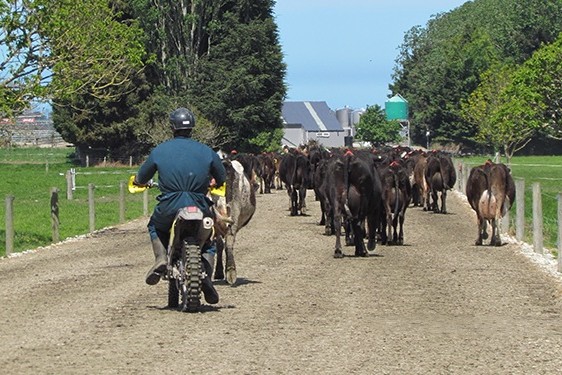The 90-day trial period when hiring new staff stays in the Employment Amendment Bill, designed to restore key minimum standards and protections for employers. The Bill was introduced to Parliament on January 29 and referred to the Education and Workforce Select Committee. Public submissions close on March 30 and the committee is scheduled to report back by August 1. Bob Edlin reports on hiring experiences which suggest dairy farmers are unlikely to be pressing for 90-day work trials to be scrapped.
Dairy farm leaders welcomed the Government’s decision to maintain the 90-day work trial clause for small to medium-sized businesses in the Employment Relations Amendment Bill. Among their reasons, a non-performing employee on a farm with few employees heaps a greater burden on the farm owner, sharemilker or contract milker and other staff.
This can mean the difference between having weekends off and holidays or not. There is a huge risk in hiring someone who turns out to be a poor performer, Federated Farmers Sharemilkers’ Section Chairperson Richard McIntyre says.
“It’s hard to get it right every time. “Often there are people who you think will fit quite well but – for one reason or another – might be a risk.”
A 90-day trial also enables a farmer to take a punt and give job opportunities to someone whose CV might raise concerns – a criminal record, for example.
“The big advantage is that it allows you to take a chance on someone,” McIntyre says.
“There are big numbers of people who struggle to get jobs because employers are reluctant to take a chance on them.
“If we took the provision out, there would be a hell of a lot more people who don’t get jobs.”
But he acknowledges that when he has interviewed prospective employees, the first question asked of him typically is whether the job will last more than three months.
“I do think the 90-day trial clause is open to abuse where people can be used just as seasonal workers during calving,” he says.
Jacqui Hahn, Federated Farmers Waikato Dairy chairperson, says the reasons and process to be followed before a termination are the same in any employment contract.
But under the 90-day clause, the reason for dismissal need not be recorded on an employee’s references.
“We just say it didn’t work out and hopefully the worker learns from the experience and goes forward from there,” Hahn says.
An Otago sharemilker says the 90-day trial clause enables him and his wife “to avoid burning ourselves out” as small business owners and to give work to someone who otherwise might not have been hired because of doubts about their suitability.
Mathew, Hahn and McIntyre share their experiences in this feature…
“I do think the 90-day trial clause is open to abuse where people can be used just as seasonal workers during calving.”
Mathew and his wife (they preferred not to give their full names) milk 550 cows as sharemilkers in Otago. They first employed someone for a trial period to fill a mid-season vacancy as 2IC.
Without the 90-day trial clause, Mathew says: “it’s highly likely at that time of year we would have pushed through to the end of the season ourselves rather than employ someone mid-season who we weren’t 100% sure on”.
Three weeks into the contract, it became obvious the working arrangement wasn’t working for the sharemilking couple and they invoked the 90-day trial clause. Next time they recruited for the job, they found the right person, “so the ability to use the 90-day trial was very important to us in being able to continue running our business to a high standard rather than trying to do everything ourselves with no days off”.
They explained to the first appointee what the 90-day trial was all about before employing him. “He understood this and was happy to be employed on that basis.”
They were aware he had a record of short-term employment, but he had plenty of dairy experience, too.
It was hard to find someone for the job mid-season, “and we thought at least he would know how to run the cow shed and shift stock”. He could. But the contract also listed performance expectations rooted in the couple’s determination to set high standards in running a model farm.
Three weeks later they sat down with him and asked how he thought he was going.
His opinion was at significant variance from their expectations. Both parties accordingly agreed to a parting of the ways.
Among Mathew’s complaints, his staffer wouldn’t wear a helmet when operating an ATV and “working around the farm, he was a bit rough around the edges”.
The crunch came when he was left in charge to allow Mathew and his wife to go to town one day. Returning earlier than expected, around 3.30-4pm, they noticed the cows had been milked. When they phoned him from the cowshed to ask how the milking was going, he told them it was going well – he was half-way through milking.
“He automatically lost our trust,” Mathew says.
Next day they had their chat. His advice to other farmers: Do due diligence, ask for references, check with the referees and ask around to try to find referees besides those listed on the CV.
Richard McIntyre
Richard with his wife Emma, milks 450 cows and rears around 600 calves a year in the Horowhenua region.
For several years he didn’t include a 90-day trial clause in employment contracts because he was concerned at the lack of security this provides for employees.
“A worker doesn’t just lose a job– they lose their house as well,” he says.
But in the past season he included a 90-day trial clause to employ a 2IC. He is pleased he did.
He checked the prospective employee’s references and made other checks to satisfy himself the candidate could step up to 2IC from a farm job he had held for five years.
“Within six weeks we got into calving and it would appear the step-up in responsibility and expectation was proving to be a real challenge,” McIntyre says.
“It was a very stressful time for us because we needed someone who could run the cowshed, monitor animal health and all that sort of stuff when we were busy with the calves, the springers and other things.
“But this wasn’t happening. I felt I had to be everywhere at once and it made things more challenging in a very difficult year.”
McIntyre was becoming frustrated because he believed the running of the farm was being severely compromised.
“We had to have someone who better fitted what we needed,” he says.
He was constantly telling his employee what had to be done to improve his performance.
“They weren’t enjoying it and I wasn’t enjoying having to tell them all the time what had to be done and putting up with a standard I wasn’t happy with. This didn’t fit
within the job description.”
McIntyre says invoking the 90-day trial clause was one of the hardest decisions he has made because he understood the turmoil this would cause the employee’s family.
“We did it at a time when I knew there would still be a demand for staff during calving,” he says.
“As things turned out, this person went for a job interview two days later and was asked if they could leave our farm earlier. Within seven days they were in a new position on a new farm.”
This was in a different region where family ties were among the advantages for the worker and the McIntyres didn’t have to go through a long process around performance management when the pressures of calving required the problem be fixed quickly.
“We spent a lot time with the worker and at the end of the day it was good for both parties.”
Essentially, McIntyre acknowledges his farm was not the right fit for this person who would be much better off elsewhere,
“in a position that better reflected their attitude and abilities, where they were celebrated as an employee rather than tolerated”.
His advice to other farmers: “It’s a privilege to have this clause there and we must be sure we don’t abuse it – but it also can be applied to call time early to the benefit of both parties.”
Jacqui Hahn
Jacqui is a partner of Hahn Trading Ltd, milking 1400 cows on three dairy units near Te Kuiti with about eight staff.
“We take on a lot of people new to the industry,” she says.
“We don’t have much choice, with the labour market as it is. “We find the 90-day trial arrangement quite useful.
“For us it’s a two-way street. If farming is not for them, they can leave without any detrimental effect to their future references or anything like that.”
The employment of a staffer was terminated in one case because he failed to turn up to work for a week without good reason and – Hahn says– “there should be no confusion about our expectations about when they are supposed to be here”.
In another case, an employee’s trainability was far below the level suggested by the references provided when he was employed.
Personality clashes with other staff were among the consequences.
“When other staff start coming to you to say ‘it’s him or us’ you don’t have much choice,” Hahn says.
“If staff are not good at turning up to work and are unable to do their job and are unable to learn, resulting in friction with other staff, you have to take action.”
Hahn mentions another incident, which posed a safety issue to her children and to co-workers with whom an employee was sharing housing. This involved sexual behaviour that came to light after he started work.
For the Hahn enterprise, getting the right staff is a lot about personality and how people gel with each other.
The person involved in the trainability issue has gone on to do well, Hahn says.
“They just needed to go to a training facility for extra help” and “we were in talks with their parents.”
Because the staffers in these cases would have been dismissed regardless of whether there was a 90-day trial arrangement, “we felt quite secure in our decisions – our expectations are well documented at the time of a job interview”.
Her advice to other farmers: “Think of it as a two-way street. The clause is there for the new employee as much as it is for you and if you see it that way, then you are pretty right.”
But using the 90-day trial and dismissing an employee at the end of it instead of hiring them on a fixed-term contract “is asking for trouble”.





